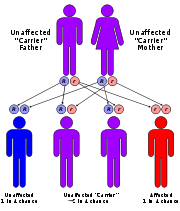
Aminolevulinic acid dehydratase deficiency porphyria
Encyclopedia
Aminolevulinic acid dehydratase deficiency porphyria (also known as "Doss porphyria," and "Plumboporphyria") is a cutaneous condition, disease can present during early childhood (as well as in adulthood) with acute neurologic symptoms that resemble those encountered in acute intermittent porphyria. The condition is extremely rare, with less than 10 cases ever reported.
ALA dehydratase deficiency is a rare cause of hepatic porphyria
. It is an autosomal recessive disorder that results from inappropriately low levels of the enzyme ALA dehydratase
(ALAD, also called porphobilinogen synthase), which is required for normal heme
synthesis.

ALA dehydratase deficiency is inherited in an autosomal recessive manner. This means a defective gene responsible for the disorder is located on an autosome
, and two copies of the defective gene (one inherited from each parent) are required in order to be born with the disorder. The parents of an individual with an autosomal recessive disorder both carry
one copy of the defective gene, but usually do not experience any signs or symptoms of the disorder.
ALA dehydratase deficiency is a rare cause of hepatic porphyria
Hepatic porphyria
Hepatic porphyrias is a form of porphyria in which the enzyme deficiency occurs in the liver.Examples include :* Acute intermittent porphyria* Porphyria cutanea tarda and Hepatoerythropoietic porphyria...
. It is an autosomal recessive disorder that results from inappropriately low levels of the enzyme ALA dehydratase
Porphobilinogen synthase
Porphobilinogen synthase synthesizes porphobilinogen through the asymmetric condensation of two molecules of aminolevulinic acid...
(ALAD, also called porphobilinogen synthase), which is required for normal heme
Heme
A heme or haem is a prosthetic group that consists of an iron atom contained in the center of a large heterocyclic organic ring called a porphyrin. Not all porphyrins contain iron, but a substantial fraction of porphyrin-containing metalloproteins have heme as their prosthetic group; these are...
synthesis.
Genetics

ALA dehydratase deficiency is inherited in an autosomal recessive manner. This means a defective gene responsible for the disorder is located on an autosome
Autosome
An autosome is a chromosome that is not a sex chromosome, or allosome; that is to say, there is an equal number of copies of the chromosome in males and females. For example, in humans, there are 22 pairs of autosomes. In addition to autosomes, there are sex chromosomes, to be specific: X and Y...
, and two copies of the defective gene (one inherited from each parent) are required in order to be born with the disorder. The parents of an individual with an autosomal recessive disorder both carry
Genetic carrier
A genetic carrier , is a person or other organism that has inherited a genetic trait or mutation, but who does not display that trait or show symptoms of the disease. They are, however, able to pass the gene onto their offspring, who may then express the gene...
one copy of the defective gene, but usually do not experience any signs or symptoms of the disorder.

